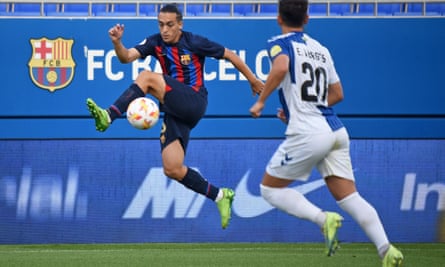Spanish football’s third tier could face collapse in the next 24 hours. A stand-off with the country’s football federation means the clubs must fall in line or risk funding being removed and the Primera Federación being abandoned just 18 months after it was set up.
With at least 18 of the 40 clubs abstaining from voting on proposed economic controls and management of the two-group Primera Federación, a ballot was set up on Tuesday night.
The clubs have 48 hours to vote by email, with a letter from Spanish football’s governing body, the RFEF, accusing a “small minority” of imposing a “blockade”, and raising the prospect of abandoning the current model.
That could mean a return to the old Segunda B, an officially amateur third tier comprising 80 teams across four regionalised divisions with a complex playoff system for promotion to the second division.
Some clubs believe that to be an act of brinkmanship designed to frighten them into backing down, but the RFEF has cited the “immediate and direct consequences” of resistance to measures on economic control and commercial exploitation, and questioned the “sense” of maintaining a competition which “the clubs themselves say is not viable”.
Late last month, 18 clubs requested in writing a formal meeting with the RFEF, which they were not granted, and stated that they could not accept plans to centralise control in the hands of the RFEF without further information.
The national federation had initially proposed two plans. If Modelo B was not agreed unanimously then Modelo A would be applied – in which none of the clubs, virtually all of which run at a loss, would receive any financial support from the RFEF. That was seen as a way of forcing Modelo B through despite the reservations clubs had over its content.
As negotiations continued on Wednesday night, the 18 dissident clubs were preparing a response.
The Primera Federación was set up in 2021 as an attempt to finally give Spain a national and professional third tier. Structured in two groups, there are 40 teams in the Primera Federación, including six youth teams: Real Madrid, Barcelona, Athletic, Celta, Real Sociedad and Osasuna. Under RFEF jurisdiction rather than La Liga, it was experimental but came with the promise of at last making the division financially viable, with suggestions that television rights could be worth as much as €40m.
Instead, they have encountered problems and financial loss. A TV and sponsorship deal with Footters broke down amid poor quality broadcasts and battles with their backers, Fuchs, which left a shortfall of more than €9m. Commercial deals have failed to materialise and the new structure saw costs increase.
Clubs, many of whom had been playing on plastic pitches, were obliged to have a capacity of at least 4,000 and playing surfaces of natural grass. At least 18 professional players had to be registered per club on a minimum salary of €20,000 each.

The number of clubs that are financially viable is in single figures and two have already been forced out of the league: Extremadura and Dux Internacional de Madrid. Dux had their registration withdrawn at the start of this season because they could not field a team for their opening game, but the TAD (Spain’s court of arbitration for sport) reinstated them for next season – a judgment the RFEF has appealed.
after newsletter promotion
Dux were among the founders of the Association of Clubs from the National Third Category in March of last year, with Real Balompédica Linense, Deportivo Linares, Union Deportiva San Sebastián de los Reyes and Rayo Majadahonda. They were soon joined by Real Unión de Irun, owned by the Aston Villa manager, Unai Emery, and became the focal point of opposition.
Set up to seek commercial deals and defend the interests of the clubs, the Association was seen as a threat by the federation. The clubs insist they are not a breakaway group, but the RFEF president, Luis Rubiales, viewed them as another front in his bitter dispute with La Liga and its president, Javier Tebas.
The 18 clubs are unwilling to cede control over commercial deals, wanting instead to maintain the freedom to pursue revenue streams, particularly after a year in which central attempts to make the division economically successful have not succeeded. They also insist that plans for economic controls remain undefined and unacceptable. This latest vote is an attempt to overcome the stalemate, with uncertain consequences.
While clubs welcome economic controls, they insist that those remain ill defined, unworkable and unacceptable, imposed and managed by the federation rather than through consensus.
In a division where six of the teams are youth sides supported by parent clubs and others aspire to promotion at the end of the season, the RFEF says a “majority” of clubs support its proposals. But with at least 18 publicly standing in opposition and confirmed votes in favour below half, that is yet to be tested, leaving the third tier on the brink of collapse.
And while few believe the competition would grind to a halt overnight, instead limping in until the summer, the vote brings with it the risk that Spanish football’s attempt to professionalise the third tier is abandoned as a failure.
